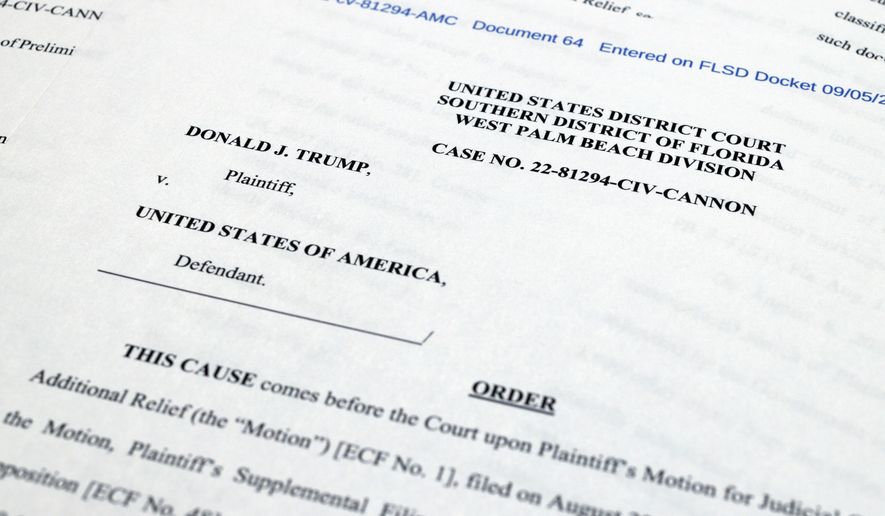Justice Department attorneys on Tuesday will urge a federal appeals court panel to end the tenure of a special master tasked with reviewing thousands of documents seized by the FBI from former President Donald Trump’s Mar-a-Lago residence, which has remained an obstacle in the government’s investigation.
The hearing before a three-judge panel on the U.S. Court of Appeals for the 11th Circuit in Atlanta is the first since Attorney General Merrick Garland appointed a special counsel to take over the investigation last week.
Prosecutors are looking into whether Mr. Trump illegally mishandled scores of White House documents, including some marked “classified” or “top secret,” by sending them to his residence rather than the National Archives in the waning days of his administration.
In a filing Monday, the Justice Department notified the 11th Circuit that the special counsel, longtime prosecutor Jack Smith, reviewed and approved the arguments its lawyers will make at Tuesday’s court hearing.
Mr. Smith will not be at the hearing because he is still in the Netherlands, where he was serving as a chief prosecutor of war crimes at The Hague. He is expected to return to the United States next week, Justice Department officials said.
The Justice Department is expected to argue that U.S. District Judge Aileen Cannon of the Southern District of Florida lacked the authority to appoint a special master to review the documents seized from Mar-a-Lago and decide whether some of them are privileged and should be kept away from investigators.
Mr. Trump had pushed for the special master, arguing that the documents are personal and should be shielded from investigators. His legal team says the special master is necessary because they don’t trust the Justice Department to avoid using personal documents in their investigation.
Mr. Trump has argued in court filings that presidents have the authority to deem White House documents as “personal” materials. Therefore, the Justice Department has no right to investigate how the materials were handled, his attorneys say.
“President Trump has an obvious interest in his own personal (and even presidential) records and the District Court acted within its discretion in recognizing a neutral party was needed to facilitate adjudication of the legal status of the documents,” his lawyers wrote.
Justice Department lawyers have slammed that argument as a “sweeping and baseless theory.” They accused Mr. Trump’s attorneys of proffering a “red herring” to slow the investigation.
“Documents commingled or collectively stored with the classified materials located at Plaintiff’s premises were lawfully seized by the FBI in accordance with the terms of the court-authorized search warrant because of their relevance to the government’s ongoing investigation,” prosecutors wrote in a court filing.
“That relevance exists irrespective of whether they were personal papers or government records. In the absence of a valid and substantiated claim of privilege, all such documents must now be made available to the investigative team,” they said.
Mr. Trump’s legal team has countered that if the special master, U.S. District Judge Raymond Dearie, doesn’t buy their arguments, he should consider labeling the documents as covered by executive privilege or attorney-client privilege.
Prosecutors have responded by insisting there is no justification for appointing a special master in the first place. They say the appointment has caused undue harm to the public’s interest because it’s held up the investigation.
Judge Dearie has said he’s trying to move expeditiously, but Judge Cannon has postponed the deadline to complete his desk from late November to mid-December.
At that point, Judge Dearie is expected to submit a report with recommendations on which documents can be used in the investigation.
However. Judge Cannon, who was appointed by Mr. Trump, will have the final call on which documents should be off-limits.
• Jeff Mordock can be reached at jmordock@washingtontimes.com.




Please read our comment policy before commenting.